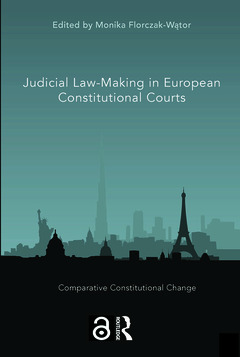Description
Judicial Law-Making in European Constitutional Courts
Comparative Constitutional Change Series
Coordinator: Florczak-Wątor Monika
Language: English
Subjects for Judicial Law-Making in European Constitutional Courts:
Keywords
constitutional courts; judicial activism; judicial law-making; constitutional interpretation; judicial review; democracy; separation of powers; positive legislation; CJEU’s Judgement; EU Legal Order; Constitutional Court's Case Law; European Constitutional Courts; Sub-constitutional Level; EU Law; Czech Constitutional Court; Polish Constitutional Court; CCs; Federal; Negative Legislator; French Constitutional Council; Supreme Administrative Court; CJEU; CCs; Constitutional Complaint; Bulgarian Cc; German Federal Constitutional Court; Cc Judgement; Cc Act; Effective Judicial Protection; Dispositive Part; Cc’s Ruling; Judicial Legislation; Latvian Cc; Partial Unconstitutionality
Publication date: 12-2021
· 15.6x23.4 cm · Paperback
Publication date: 05-2020
· 15.6x23.4 cm · Hardback
Description
/li>Contents
/li>Readership
/li>Biography
/li>
This book analyses the speci?city of the law-making activity of European constitutional courts. The main hypothesis is that currently constitutional courts are positive legislators whose position in the system of State organs needs to be rede?ned.
The book covers the analysis of the law-making activity of four constitutional courts in Western countries: Germany, Italy, Spain, and France; and six constitutional courts in Central?East European countries: Poland, Hungary, the Czech Republic, Slovak Republic, Latvia, and Bulgaria; as well as two international courts: the European Court of Human Rights (ECtHR) and the Court of Justice of the European Union (CJEU). The work thus identi?es the mutual interactions between national constitutional courts and international tribunals in terms of their law-making activity. The chosen countries include constitutional courts which have been recently captured by populist governments and subordinated to political powers. Therefore, one of the purposes of the book is to identify the change in the law-making activity of those courts and to compare it with the activity of constitutional courts from countries in which democracy is not viewed as being under threat. Written by national experts, each chapter addresses a series of set questions allowing accessible and meaningful comparison.
The book will be a valuable resource for students, academics, and policy-makers working in the areas of constitutional law and politics.
Introduction;
PART I: Western European Constitutional Courts;
Chapter 1: France;
The French Constitutional Council as a Law-Maker. Relations Between the Council and the Legislator: From Dialogue to Rewriting?;
Chapter 2: Germany;
The Law-Making Activity of the German Federal Constitutional Court: A Case-Law Study;
Chapter 3: Italy;
The Law-Making Power of the Constitutional Court of Italy;
Chapter 4: Spain;
The Spanish Constitutional Court as a Law-Maker: Functioning and Practice;
PART II: Central and Eastern European Constitutional Courts;
Chapter 5: Bulgaria;
The Constitutional Court of the Republic of Bulgaria as a Law-Maker;
Chapter 6: Czech Republic;
The Law-Making Activity of the Czech Constitutional Court;
Chapter 7: Hungary;
The Hungarian Constitutional Court as a Law-Maker: Various Tools and Changing Roles;
Chapter 8: Latvia;
The Constitutional Court of the Republic of Latvia as a Law-Maker: Current Practice;
Chapter 9: Poland
The Law-Making Activity of the Polish Constitutional Tribunal;
Chapter 10: Slovak Republic;
The Many Faces of Law-Making by Constitutional Courts with Extensive Review Powers: The Slovak Case;
PART III: European International Courts;
Chapter 11: Court of Justice of the European Union;
The Court of Justice of the European Union as a Law-Maker: Enhancing Integration or Acting Ultra Vires?;
Chapter 12: European Court of Human Rights;
The European Court of Human Rights and the Creation of Law through the Case-law;
PART IV: Comparative Analysis;
Chapter 13: European Constitutional Courts as Law-Makers: Research Synthesis;
These books may interest you

Comparative Constitutional Reasoning 149.96 €



